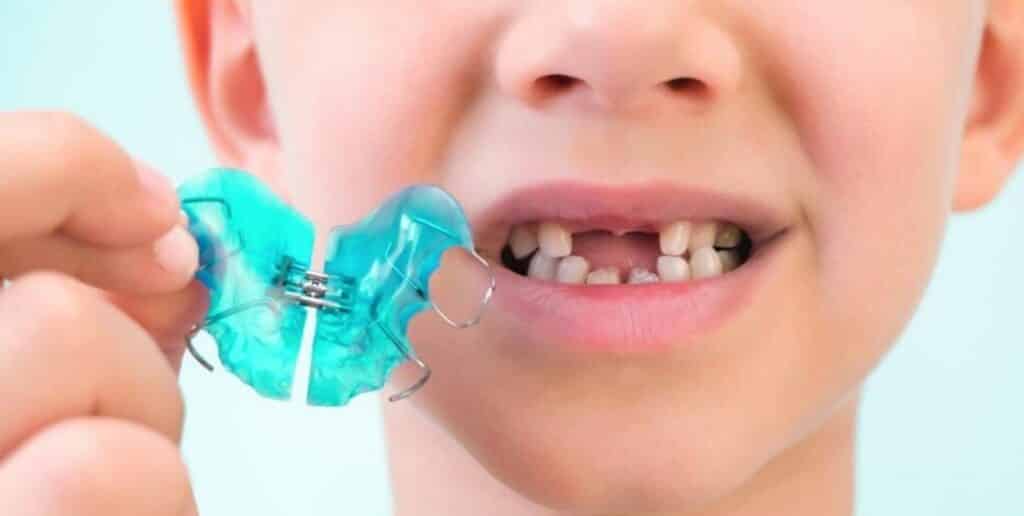Braces for children have long ceased to be the biggest nightmare. It is invariably crooked teeth, over 26% adults are not happy with their smile. If you don't want your child to be among this group take care of it today. Read our article and find out when it's a good idea to get braces, how much braces cost for children and the consequences of neglecting them as a child.
What are the consequences of untreated malocclusion?
Squeezed, overlapping teeth cause decay and gum disease. Why? It is extremely difficult to clean them - especially for a child who does not yet have perfect technique. Untreated malocclusion in a child can result in the teeth moving in the future and eventually - falling out. Importantly, malocclusion is not always visible at first glance.
Crooked teeth are also often accompanied by chewing problems, a speech defector even a receding chin. This in turn affects, among other things, the digestive system, learning, appearance and self-esteem of the toddler and, later, the adult. Read more about the consequences of childhood neglect in our article "Crooked teeth - causes and how to get rid of an embarrassing smile".
Malocclusion also often has the social dimension already mentioned. Children who are ashamed of their teeth are reluctant to speak, reluctant to smile, and are often the object of ridicule and challenge.

Braces for children's teeth - when to start treatment?
You need to know that the condition of your child's teeth can be assessed very early. Therefore, it is not worth delaying the first visit to the dentist. This one should take place when the first tooth appears. Firstly, it is a good opportunity to check the condition of your little one's mouth and secondly, to familiarise him or her with the dental surgery. We wrote more about what an adaptation visit looks like in the article "Your child's first visit to the dentist in the UK„.
Unfortunately, there is still a persistent habit among some people of the belief that it is not worth treating milk teeth because they will fall out anyway. Nothing could be further from the truth!
If a child does not take care of their teeth almost 100% caries will appear. Millipedes are much less mineralised than permanent teeth, thus bacteria very quickly lead to their complete decay. In such a situation, tooth extraction is often a necessity. This has a direct impact on the bite, but can also lead to deformation of the jaw. Do you want to find out how to avoid this? Read our text: "How do you look after milk teeth in children and why is it so important?".
It is also worth adding that milk teeth do not always fall out in time! When a given deciduous tooth stays too long, the permanent tooth will erupt in a different direction than it should. We have written more on this subject here: "Crooked teeth in children - causes, prevention and treatment".
This is why it is so important to take care of your child's teeth from an early age, including regular visits to the dental surgery. During the visits, the dentist will be able to assess whether the teeth are growing properly and implement orthodontic treatment as soon as possible, if necessary.

Types of braces
If the doctor recommends orthodontic treatment your child will wear removable or fixed braces. Usually, the former are fitted to toddlers up to the age of 12, fixed braces to older children. There are also situations in which the doctor decides to fit fixed braces to a patient under the age of 12. Prerequisite - no deciduous teeth.
Removable braces, as the name suggests - are worn and removed by the patient. Most often it should be worn throughout the night and for several hours during the day. A very important task, yours as a parent, is to ensure that your child follows the doctor's instructions. Otherwise, orthodontic treatment will be of no use.
If the doctor recommends fixed braces your child will wear either standard braces (metal or ceramic) or self-ligating braces. In the latter, the arch is attached directly to the brackets. There is no need for ligatures as with standard braces. Here too, there are two options to choose from - metal or porcelain braces. What is the difference between the two? Purely aesthetic - porcelain is almost invisible.
We have written more about the cameras in our text Types of braces in the UK - what to choose. IMPORTANT: Whatever braces your child will wear, it is important to remember proper oral hygiene. How to take care of the teeth and the braces themselves we wrote in the article: How to care for teeth with braces.

How much do braces cost for a child?
Prices for removable braces for children at our practice are £300 for one arch and £500 for two. As for fixed standard metal braces, these cost £600 for one arch and ceramic braces cost £900 per arch.
We also offer the aforementioned fixed selfligature braces. They cost £900 per arch (metal) and £1200 (porcelain).
We recognise that often the cost of orthodontic treatment can be a burden for your household budget. At our practice, we offer convenient instalments. You can read more about them in our article: "Teeth on credit: dental treatment on hire purchase".
As a result, you will pay £29 per month for the aforementioned removable braces for 1 arch, while you will pay just under £75 per month for fixed ceramic braces. If you have any further questions we encourage you to contact!
Important: our instalment system is 100% secure and regulated by the Financial Conduct Authority (FCA number 619628).

